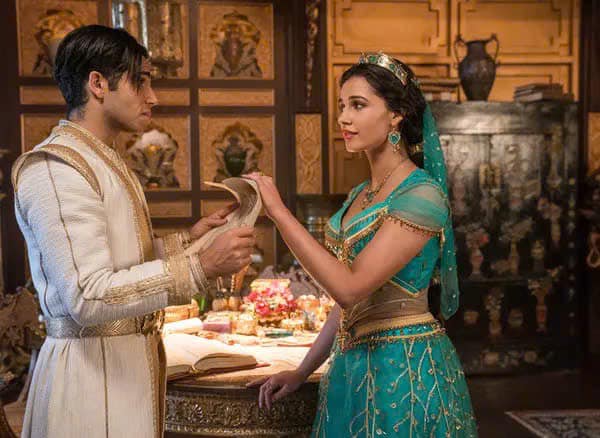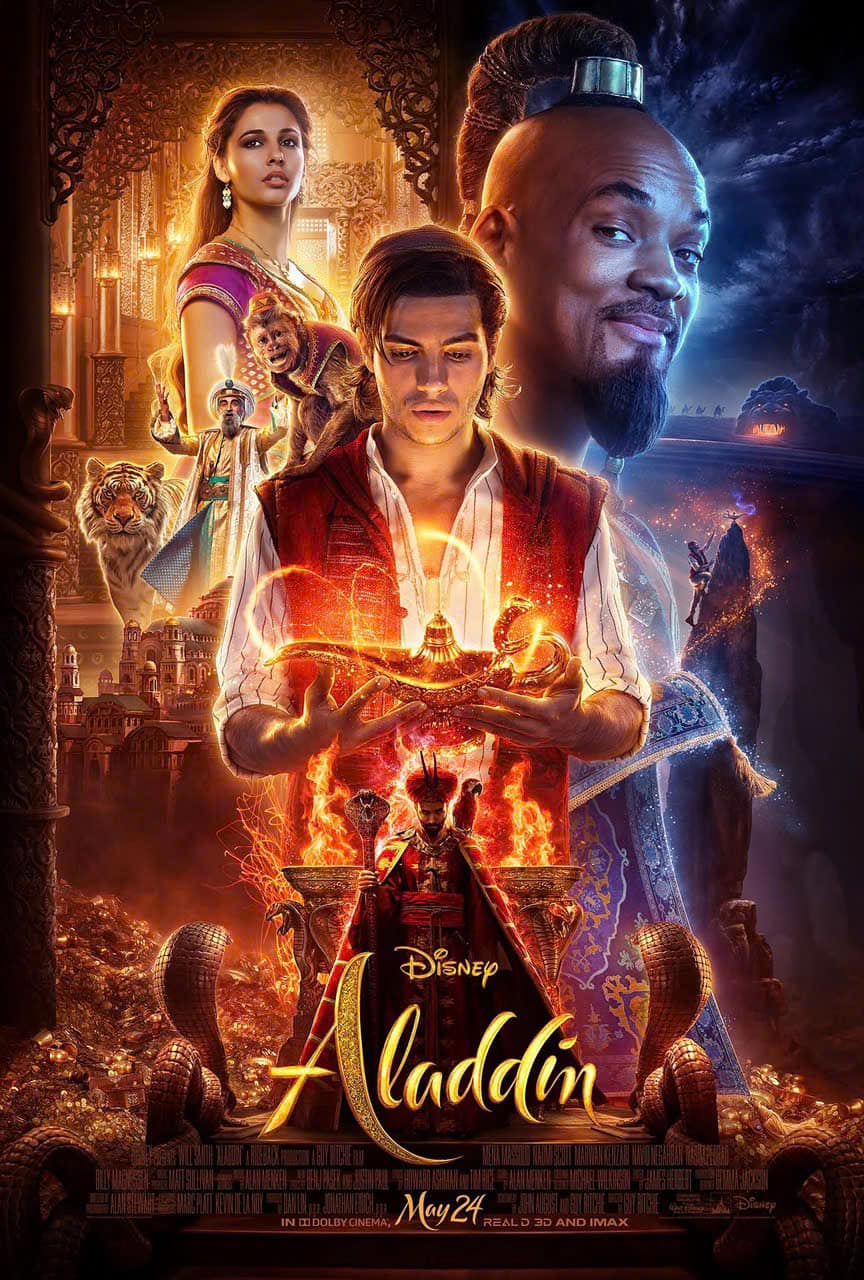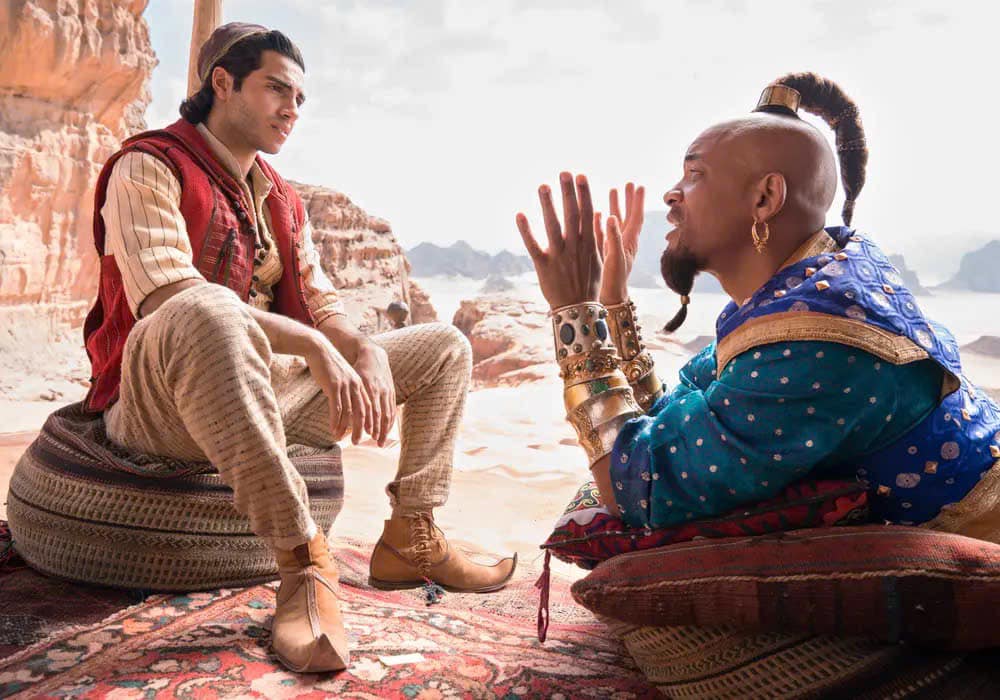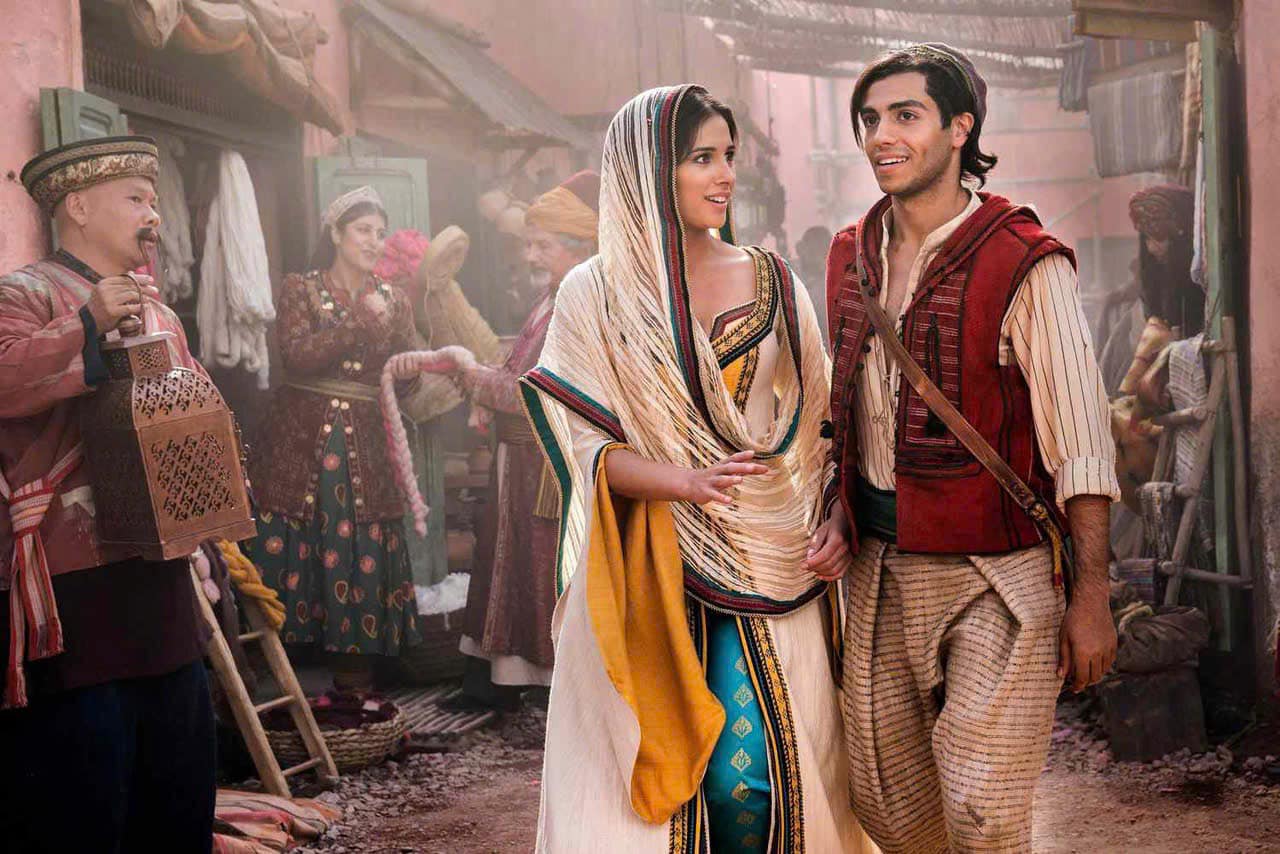Aladdin (2019)

Aladdin (2019)
Aladdin (2019), directed by Guy Ritchie, is a live-action adaptation of Disney’s 1992 animated classic. This version brings the vibrant world of Agrabah to life, with Will Smith stepping into the role of the Genie, and Mena Massoud playing the titular Aladdin. While staying faithful to the original’s iconic story and music, the live-action remake brings fresh energy to the familiar tale, updating some aspects while maintaining the magic and charm that made the animated version a timeless classic.

Plot Overview:
The story follows Aladdin (Mena Massoud), a “diamond in the rough” street thief who falls in love with Princess Jasmine (Naomi Scott) of Agrabah. When he stumbles upon a magical lamp and releases the all-powerful Genie (Will Smith), he is granted three wishes. Aladdin uses his wishes in an attempt to win Jasmine’s heart, posing as a prince to impress her. However, his plans are complicated by the sinister sorcerer Jafar (Marwan Kenzari), who seeks to take over the kingdom and will stop at nothing to gain control of the lamp.
The film largely follows the same beats as the animated original, including the iconic “A Whole New World” flying carpet ride and the thrilling final battle with Jafar. However, the live-action adaptation introduces new elements, including deeper character development for Princess Jasmine and more emphasis on her desire for independence and leadership.
Key Themes:
Identity and Self-Acceptance: At its heart, Aladdin (2019) is a story about personal growth and self-acceptance. Aladdin struggles with his identity as a poor street rat and feels he must disguise himself to be worthy of Princess Jasmine’s love. Ultimately, the film emphasizes that who you are is more important than what you have, and true love is built on honesty, kindness, and integrity, not wealth or status.

The Power of Friendship and Loyalty: The bond between Aladdin and his loyal companions—Abu the monkey, the magic carpet, and the Genie—is central to the story. Aladdin’s friendship with the Genie is particularly heartwarming, as the two navigate their desires for freedom and fulfillment. The film highlights the importance of loyalty, selflessness, and supporting those who truly care for you.
Leadership and Empowerment: Princess Jasmine’s character is given a stronger voice in the 2019 version. Instead of merely being a damsel in distress, Jasmine is portrayed as a strong, determined woman who desires to be a leader in her own right. This modernization of her character brings a fresh angle to the story, focusing on her aspirations to rule Agrabah with compassion and fairness, and challenges the traditional gender roles.
Freedom and Choice: A recurring theme in Aladdin is the idea of freedom—Aladdin wishes to escape his life of poverty, the Genie longs to be free from servitude, and Jasmine seeks the freedom to rule. The film explores how freedom is not just about escaping limitations, but about taking control of one’s destiny, making choices, and using power for the greater good.
Visuals and Direction:
Guy Ritchie brings his energetic and stylish directorial approach to Aladdin (2019), making the film visually engaging. The vibrant streets of Agrabah are full of color, life, and detail, with the sets offering a rich, immersive backdrop for the story. The lavish palaces, bustling markets, and magical desert landscapes are brought to life with CGI, contributing to the film’s dazzling aesthetic.
The magic is especially captivating—Genie’s transformations and magical tricks are well-executed and visually exciting, with a playful, lighthearted tone. The flying carpet ride, one of the most iconic scenes from the original film, is just as breathtaking and romantic in this version, with sweeping visuals and a sense of wonder that captures the spirit of adventure.
However, the film’s pacing can sometimes feel uneven, especially when the story takes a slight detour into the more dramatic moments or extended musical sequences. Some viewers may feel that certain scenes could have been tighter or more focused on the central narrative.

Acting:
Will Smith’s portrayal of the Genie is the film’s biggest departure from the original. Rather than attempting to emulate Robin Williams’ legendary performance, Smith brings his own flair to the character. He gives the Genie a more contemporary, fun-loving energy, with some references to pop culture and modern-day humor. Smith’s performance is playful and charismatic, though some may find his portrayal to be a bit more subdued than Williams’ over-the-top antics. His musical numbers, particularly “Friend Like Me,” are high-energy and infectious, giving the Genie a new but still memorable dimension.
Mena Massoud’s Aladdin is charming and likable, though his performance occasionally lacks the depth of his animated counterpart. Massoud portrays Aladdin’s internal struggle with authenticity, and his chemistry with Naomi Scott as Jasmine is solid, though some of the more dramatic moments could have benefited from a stronger emotional connection.
Naomi Scott shines as Princess Jasmine, giving the character more agency and independence. Her portrayal of Jasmine is empowering, and Scott’s vocal performance of “Speechless,” a new song written for the film, is one of the film’s highlights. “Speechless” serves as a powerful anthem for Jasmine’s desire for change and her fight for her right to rule.
Marwan Kenzari plays the villainous Jafar, but his performance lacks the sinister charisma of the animated Jafar. While Kenzari’s Jafar is still menacing, his character doesn’t have the same biting wit or grandiosity that made the original villain so memorable. Jafar’s motivations also feel somewhat underdeveloped, leaving his role as the antagonist feeling less compelling than in the original.
Music:
The soundtrack of Aladdin (2019) is a delightful mix of nostalgia and fresh additions. The film stays true to the original songs by Alan Menken, Howard Ashman, and Tim Rice, with beloved classics like “A Whole New World,” “Friend Like Me,” and “Prince Ali” still taking center stage. These musical numbers are recreated with vibrant choreography and high-energy performances, making them stand out in a live-action setting.

One of the notable additions to the soundtrack is the song “Speechless,” performed by Princess Jasmine (Naomi Scott). This new anthem for Jasmine is empowering and adds a modern twist to the film’s themes of self-expression and independence. The song has a contemporary pop sound, and Scott’s powerful vocal performance makes it a memorable moment in the film.
However, some critics felt that the remakes of the original songs lack the same magic that the animated film delivered. The orchestrations are grand and cinematic, but the live-action versions occasionally miss the vibrant energy of the animated sequences.
Criticism:
While Aladdin (2019) is visually stunning and brings a fresh perspective to the classic story, it doesn’t always capture the same magic as the original. The biggest challenge is Will Smith’s portrayal of the Genie, which, while enjoyable, doesn’t quite measure up to Robin Williams’ legendary, larger-than-life performance. Additionally, the film’s pacing can feel uneven, particularly when the story takes detours into dramatic or musical sequences that don’t always flow seamlessly into the main narrative.
Another potential issue is the lack of development for certain supporting characters, like Jafar, who feels more one-dimensional compared to his animated counterpart. Some of the character motivations could have been fleshed out more to create a more engaging villain.
Conclusion:
Aladdin (2019) is a vibrant, colorful, and fun adaptation of the Disney classic, with strong performances from the cast, particularly Naomi Scott as Jasmine and Will Smith as the Genie. The film updates the story with a stronger emphasis on Jasmine’s character and offers some fresh songs, like “Speechless,” that add depth to the narrative. However, the film struggles to fully recapture the magic and charm of the original, and while it’s visually stunning, it doesn’t always deliver the same emotional impact.











